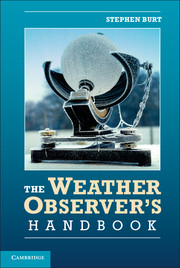Book contents
- Frontmatter
- Contents
- Acknowledgements
- Abbreviations, footnotes and references
- Part One The basics
- 1 Why measure the weather?
- 2 Choosing a weather station
- 3 Buying a weather station
- 4 Site and exposure – the basics
- Part Two Measuring the weather
- Part Three Making the most of your observations
- Appendix 1 Metrology and meteorology: The basics of instrument theory
- Appendix 2 Useful functions
- Appendix 3 Unit conversions
- Appendix 4 Useful sources
- Index
- References
1 - Why measure the weather?
Published online by Cambridge University Press: 05 July 2012
- Frontmatter
- Contents
- Acknowledgements
- Abbreviations, footnotes and references
- Part One The basics
- 1 Why measure the weather?
- 2 Choosing a weather station
- 3 Buying a weather station
- 4 Site and exposure – the basics
- Part Two Measuring the weather
- Part Three Making the most of your observations
- Appendix 1 Metrology and meteorology: The basics of instrument theory
- Appendix 2 Useful functions
- Appendix 3 Unit conversions
- Appendix 4 Useful sources
- Index
- References
Summary
Of all the physical sciences, meteorology depends more than any other on frequent, accurate and worldwide measurements. Every day, millions of weather measurements are made by thousands of people across the globe, on land, over the oceans, in the upper air and from space, providing the raw data essential to supercomputer-based weather forecasting models that are vital to modern economies. Meteorology (and its statistical cousin, climatology) is one of the few sciences where both amateurs and professionals make significant contributions.
‘Measuring the weather’ is undertaken for many different reasons: as well as input to weather and climate forecasts, it is a vital part of aviation safety, critical in detecting and quantifying climate change, keeping tabs on typhoons and hurricanes, monitoring the ebb and flow of pollutants and arctic ice, and hundreds of other applications of enormous benefit to society. Weather records are made in every country and region in the world – from the hottest deserts to the coldest polar regions, from densely populated city centres to the most remote mountaintops. There is even a permanent automatic weather station at 8,000 metres above sea level just below the summit of Mt Everest (Figure 1.1), whose observations are updated to the Internet hourly.
- Type
- Chapter
- Information
- The Weather Observer's Handbook , pp. 3 - 31Publisher: Cambridge University PressPrint publication year: 2012



